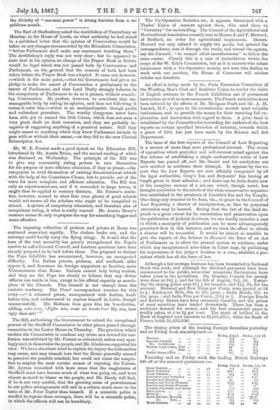The Earl of Shaftesbury asked the Archbishop of Canterbury on
Monday, in the House of Lords, on what authority he had stated in a published letter that the opinion of Convocation would be taken on any changes recommended by the Ritualistic Commission, " before Parliament shall make any enactment touching them." The Archbishop's reply was not very clear ; but he appeared to Mate that in his opinion no change of the Prayer Book or Rubric would be legal which was not passed both by Convocation and Parliament, on the,ground that the consent of both had been taken before the Prayer Book was adopted. It came out, however, —which is the main point,—that the Government had given no pledge to make the assent of Convocation a preliminary to the assent of Parliament, and that Lord Derby strongly believes in the competency of Parliament to do as it pleases, without consult- ing Convocation. He prefers, however, to conciliate that un- manageable body by asking its opinion, and then not following it 'unless it suits him,—which is an unobjectionable though prolix and redundant procedure. The worthy clergymen never have been able yet to amend the 29th Canon, which does not seem a very great draft on their resources, and they are probably in- capable of suggesting anything of a practical nature. Still they might assent to anything which they knew Parliament intends to pass with or without their assent,---as they did to the new Clerical Subscription Act.






























 Previous page
Previous page